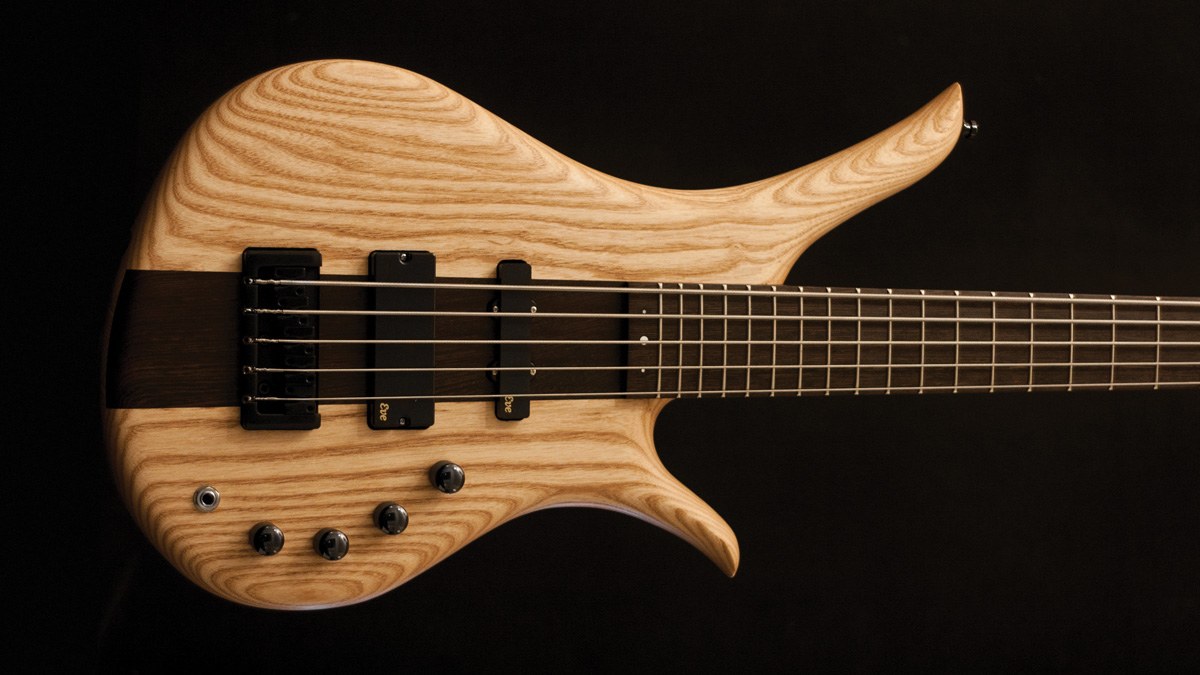MusicRadar Verdict
If you want a handmade bass with a handmade feel, consider an Eve.
Pros
- +
A chance to own a genuine one-off at a reasonable price.
Cons
- -
None.
MusicRadar's got your back
We’ve made the point several times that we bassists are living in a second golden age.
A huge range of bass gear is now available, with the size of that range crucially matched by an expectation that the days when we were forced to accept low quality for low prices are long gone. You could say the same about bespoke and/or handmade bass guitars: for a reasonable outlay given the work hours and materials involved, you can approach any of a number of small British, European or American luthier firms in search of the perfect one-off bass.
Dundee’s Eve company is one of these firms, as head honcho Doug Mullen explains every month in his column in Bass Guitar Magazine. With its sleek shape and air of elegance, Doug’s latest Iona is a thing of beauty all right. Let’s see how it performs...
Build
It takes some imagination to produce a unique guitar shape in today’s oversaturated market, but Doug has pulled this off: there’s no mistaking the two diverging horns that typify an Iona. Oiled and waxed to a perfect finish, the body begs you to pick it up and give it a stroke, although its slender depth and petite proportions may feel a little undersized to ‘amply-nourished’ bassists. This is a gazelle, not a buffalo.
The construction itself doesn’t offer any surprises: Eve has built a reputation for attention to detail, and the relevant components of this five-string are engineered and assembled to the highest standard. Woods are clearly something of an obsession for Doug, and he’s used a variety of exotic timbers throughout, from the truss rod cover to the battery cavity lid and beyond. The design is uncluttered, so you won’t get fret markers at the front of the neck, and the Warwick tuners and Spector bridge are both of the quality you’d expect from those brands.
The wooden components are handmade, and the entire instrument hand-assembled, so there’s a definite feel to the Iona which a mass-produced bass doesn’t have. It’s hard to explain in words, because there are no flaws that we can see: however, there’s a real sense that here and there, hands have shaped this instrument. If you’ve ever examined a handmade cabinet or wooden sculpture, you’ll know what we mean. Without wanting to disappear sphincterwards, you can almost discern a human feel about this bass.
Sounds
The Iona offers a wide range of tonal options, with a Jazz-style single-coil in neck position - although it’s fairly far back along the body, almost like a middle pickup - and a soapbar at the bridge.
Each unit has a dedicated volume, both with push-pull operation: the bridge pot offers series and parallel mode, the neck equivalent active or passive mode. Along with bass and treble boost/cut options, it’s a simpler system than you might think, and easily accessible whatever tone you’re after. The exception is a truly earth-shaking bottom end: where the slender Iona excels is in the mids and treble zones, so if you’re a reggae player, for example, consider a weightier instrument.
In passive mode, the Iona is a perfectly decent instrument, with its default range highly usable. The active circuit is so effective that it’s a shame not to use it, however, so flip into active mode and the tone range opens wide up. A grippy, cutting sound is easy to find for slap and pop, and don’t be afraid of boosting the low end for more thud. With friendly string spacing and action, plus a well-balanced weight distribution, there’s no reason not to enjoy the heck out of this bass. In use, you may find that there are more tone options than you really need, but it’s a nice problem to have.
For under £1,600, this bass is an easy winner at its price point: investigate an Iona of your chosen spec with our full recommendation. Be warned if you’re thinking of gigging it, though: that finish won’t stand up to being stepped on by a clumsy drummer. Personally we’ve dented too many nice basses (or had them dented for me) to ever want to take an Iona out of the house, so think twice before you entrust yours to an intoxicated roadie.
“A synthesizer that is both easy to use and fun to play whilst maintaining a decent degree of programming depth and flexibility”: PWM Mantis review
“I feel like that song had everything we needed to come back with”: Bring Me The Horizon’s Lee Malia on Shadow Moses, its riff and the secrets behind its tone, and why it was the right anthem at the right time
“I said, ‘Are we sure we can write a song about death?’”: The story of Mike + The Mechanics' classic No.1 The Living Years










